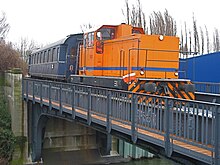Industrial line Berlin
| IGB Industriebahn-Gesellschaft Berlin mbH
|
|
|---|---|
| legal form | GmbH |
| founding | 1988 |
| Seat | Berlin , Germany |
| management | Detlef Brocker |
| Number of employees | 30 (2010) |
| Website | www.captrain.de/IGB |
The Industrial Railway Society Berlin mbH (IGB) is a rail transport - and -infrastrukturunternehmen that in Berlin freight on the remaining route network in Neukölln and Ruhleben performs. The route network has a length of around 21 kilometers. The shareholders are Captrain Deutschland GmbH (50.2%) and BEHALA (49.8%). IGB is the majority shareholder in Niederbarnimer Eisenbahn -AG (66.9%).
history
The IGB was founded on December 23, 1988 by the State of Berlin to coordinate the operation of all 16 Berlin small and private railways (for example the Neukölln industrial railway ). In the course of privatization efforts, Berlin sold 99% of the shares in 1996 and 1997. In order to expand freight traffic, the subsidiary Rail Cargo Berlin GmbH (RCB) was founded on May 16, 2000 together with Prignitzer Eisenbahn GmbH (PEG) . After initial success, this company was merged with another Captrain subsidiary, Regiobahn Bitterfeld GmbH, on January 1, 2005 to form Regiobahn Bitterfeld Berlin GmbH (RBB).
Route network


The entire IGB network has a track length of 21 kilometers. About 1 million tons of goods are transported on it.
In Neukölln , starting from the freight station of the same name (Gbf) via the Gbf Treptow , a remaining connection at the end of the line in the industrial area on Nobelstrasse is served on an approximately 10-kilometer rail network. Operation is complicated, as up to three changes of direction are required. The sweeping track in Lahnstrasse, from which numerous sidings previously branched off, was shortened to the minimum length for sweeping a group of wagons in early 2000. On the industrial track leading to the operating point in Dieselstraße, two connections and the Estrel , the largest hotel in Germany, were occasionally served, for which a separate platform was reserved for rare special trips. Due to the planned enlargement of the hotel, the abandonment of the use of the rail by the connections (including the workshop) east of the Neukölln shipping canal as well as the new construction of the BAB 100 , this section of the route was abandoned in 2015 and also the siding to Nobelstraße, which is still used daily, in the area of the under construction Highway tunnel under Grenzallee, temporarily relocated.
The Berlin-Treptow freight yard was acquired in 2006 by Klösters Baustoffwerke based in Kerpen and put back into operation on July 1, 2010. Because of the poor condition of the tracks, only tracks 10 and 11 could be saved and reactivated. In September 2014, the two tracks were expanded to a usable length of 576 m. A switch connection was also newly installed. Operator of the Gbf. Treptow is Vepas Bahnservice based in Ludwigsfelde on behalf of Klösters Baustoffwerke. Since 2011, block trains with building materials from the Röderau and Mühlberg gravel works have been running regularly to Berlin. By the end of January 2015, IGB had completed the last mile for these train services between Neukölln station and the Gbf. Treptow.
From Gbf Ruhleben be siding owner in South Haven Spandau , in Ruhleben and Siemens city served.
Freight transport
Since July 1, 1993, a 510-meter-long coffee logistics train with 60 containers containing around 1,200 tons of green coffee has been running on the Neukölln route network from Bremen twice a week to a Mondelēz International roastery in Nobelstrasse. The train is delivered in three to four wagon groups due to the short sweeping track in Lahnstrasse. This transport has been completely shifted from the road to the railroad. By the 15th anniversary in mid-2008, 1,500 trains ran, replacing around 100,000 truck trips.
vehicles
The IGB has four locomotives.
Web links
- Industriebahn GmbH website about Captrain Deutschland GmbH
- Pictures of the Berlin industrial railway
- Vehicle list
Individual evidence
- ↑ Annual financial statements for the business year from January 1, 2010 to December 31, 2010. June 17, 2011, accessed March 9, 2012 .
- ^ "Map overview of private and industrial railways in Berlin" . Archived from the original on May 17, 2011. Retrieved January 4, 2011.
- ^ "History of the Neukölln Industrial Railway" . Archived from the original on May 17, 2011. Retrieved January 4, 2011.
- ↑ Cf. “Privatization of company investments in Berlin since 1990”, p. 187 . Retrieved January 4, 2011.
- ↑ cf. "PEG Commitment in Freight Transport: Rail Cargo Berlin GmbH" . Retrieved January 4, 2011.
- ^ IGB Industriebahn-Gesellschaft Berlin mbH: Efficient logistics concepts for Berlin's industry. 2011, accessed March 9, 2012 .
- ↑ http://www.captrain.de/fileadmin/Redaktion-Captrain/PDF/Eisenbahninfrastructure/Berliner_Umland/IGB_NBS_Liste_der_Entgelte.pdf. (PDF; 18 kB) (No longer available online.) March 1, 2012, archived from the original on October 20, 2013 ; Retrieved March 9, 2012 .
- ↑ Justification for the development plan XIV-245ba (Sonnenallee 228) for the property Sonnenallee 228, a siding of the industrial railway and a section of the Neukölln shipping canal in the Neukölln district, pp. 34 and 52f. (PDF) District Office Neukölln, Office for Planning, Building Regulations and Surveying, Department of Urban Planning, March 25, 2003, accessed on October 15, 2017 .
- ↑ A100 expansion: From today on Grenzallee closures. BZ , June 3, 2014, accessed October 15, 2017 .
- ↑ See Kraft Foods Germany, "" Zügiger "and environmentally friendly transport of green coffee from Bremen to Berlin", press release July 2008 . Archived from the original on November 15, 2008. Retrieved January 4, 2011.
- ↑ See DB press release of July 29, 2008: "1,500 coffee trains: DB Schenker and Kraft Foods raise their cups on the occasion of 15 years of Jacobs Café Logistik-Zug . Accessed on May 11, 2014.
- ^ "IGB vehicles" . Retrieved October 19, 2013.


